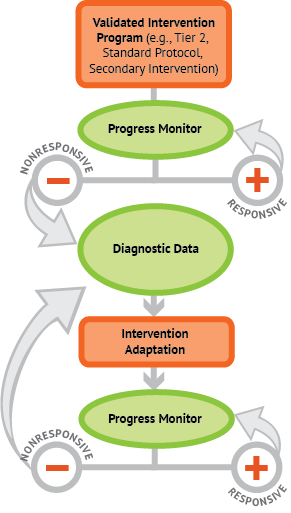What is Data-Based Individualization?
Intensive intervention helps students with severe and persistent learning and behavioral needs, including students with disabilities. Data-based individualization (DBI) is NCII's approach to intensive intervention.
What is Data-Based Individualization?
DBI is a research-based process for individualizing and intensifying interventions through the systematic use of assessment data, validated interventions, and research-based adaptation strategies. DBI is a process, not a specific program or product. The process is driven by data, characterized by increased intensity and individualization, and considers the academic and behavioral needs of the student. In some schools, intensive intervention may be known as “Tier 3 intervention,” and may be embedded within a multi-tiered system of support (MTSS) framework.
DBI is the technical term for what many good teachers do naturally through the problem-solving process: frequently review student data and make changes to their teaching based on what works for students. DBI, however, makes this process systematic, explicit, and tailored to meet the needs of individual students through a multi-step process that gradually intensifies instruction and support. Learn more.
Click on each step of the DBI graphic to learn more about the DBI process and find relevant resources.

Why is DBI Important for Students?
Outcome data suggest that our current system does not adequately prepare students with the most intensive needs, particularly students with disabilities. Students with disabilities continue to fall behind their same-age peers in reading and math and are more likely to experience discipline problems at school. In addition, although validated intervention programs have been found to be effective for many students, some students will not respond to the intervention as designed.
Who needs DBI?
DBI is intended to help a small subgroup of students who:
- Are not making adequate progress in their current intervention program (often, a Tier 2, evidence-based intervention)
- Are not meeting individualized education program (IEP) goals
- Have persistently low academic achievement
- Have high-intensity/frequency behavior


